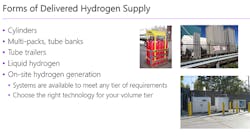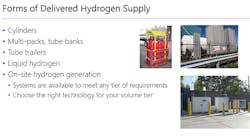What you need to know about hydrogen generator installation
David Wolff, region manager for Nel Hydrogen, has an extensive background in large- and small-scale hydrogen generation, hydrogen distribution, storage and industrial utilization, as well as application knowledge across a wide range of industries. During the Q&A portion of the webinar, “Engineering and Safety: A Project Manager's Guide to Hydrogen Generator Installation,” Wolff helps to streamline the process of installing a hydrogen generator.
PS: How do I know if my operation might benefit by generating hydrogen?
DW: The types of issues that might indicate that it makes sense to look at generating your own hydrogen are: Do you have issues relating to hydrogen storage on your site? Is your landlord unhappy? Are your neighbors unhappy? Is the local authority having jurisdiction or the fire marshal unhappy? Are your employees unhappy? Or, is your site rented in which case you need to think about moving somewhere down the line and you're going to be hesitant to invest in that site?
Another suggested approach that indicates that hydrogen generation might be a good direction for you is if you're looking for cost certainty and cost reduction, so you can be certain of your hydrogen costs when you control both the equipment as well as the raw materials that go into making your hydrogen. Hydrogen generation can often supply a high purity grade of hydrogen at the same cost as a lower purity delivered. Finally, I would focus on space utilization. Customers find that hydrogen storage takes much more space than they had associated just with the equipment itself because of the requirements associated with NFTA 55, which is the hydrogen standard.
PS: How do I figure out what generating hydrogen is going to cost us?
DW: Generating hydrogen entails buying a piece of equipment and then operating that equipment. The first thing you're going to be doing is you're going to be buying a piece of capital equipment. The more hours you use that equipment and the more intensely you use it, then the less it's going to cost you per unit of hydrogen generated. Use it harder, use it longer, and that'll give you your lowest cost. That's why we spend a lot of time working with customers to make sure that we size the equipment correctly.
I've seen a lot of questions asking about my remarks on the hybrid model using stored hydrogen to address the hydrogen peaks. And this is a way to address occasional peaks in the most cost-effective fashion. We suggest you depreciate that capital equipment over a period of time that makes sense with that specific equipment. In the case of our hydrogen generators from Nel, we don't require appreciable expensive maintenance until you reach about 10 years. It's 10 years out before you have a meaningful capital investment in that hydrogen generator. We suggest that you consider depreciating it or annualizing your costs over a period of about 10 years, 120 months.
If you take the cost of the equipment, add to it the cost of installation of $10,000 to $25,000 depending on the capacity of the equipment that you put in and then you add to that the variable costs, 95% of the variable cost is electricity, it's a simple calculation. It's the efficiency of the equipment, which is typically 16 to 18-kilowatt hours per hundred cubic feet, or around five-kilowatt hours per normal meter cube and you multiply your electrical efficiency times your electricity rate, and you get your variable hydrogen cost.
A typical pie chart for smaller capacity hydrogen generators is about 60% fixed cost, 35% variable cost, and 5% maintenance. For larger capacity say 1000 cubic feet an hour up to 10,000 cubic feet an hour, the pie chart is closer to 40% fixed, 55% variable, and 5% maintenance, and we'd be happy to help people with the calculations.
PS: What are the different technology approaches to generating hydrogen at my site?
DW: You've got to start with something that has hydrogen in it – we don't extract hydrogen from the air. Your two choices really are hydrogen from water, which is one form or another of electrolysis, or hydrogen from hydrocarbons, which is typically thought of as a steam methane reformer. Electrolysis uses electricity whereas hydrocarbon reforming uses hydrocarbon energy to run the process. In general, hydrocarbon reforming is for much larger hydrogen generation needs then would be of interest to most people on this phone call.


